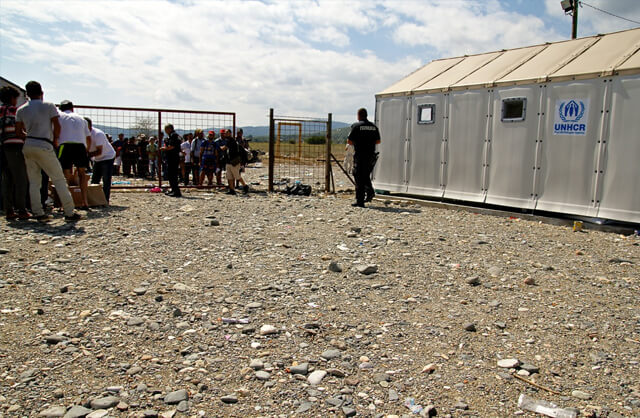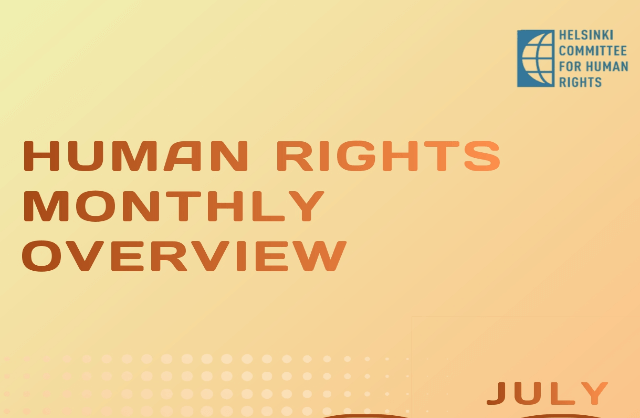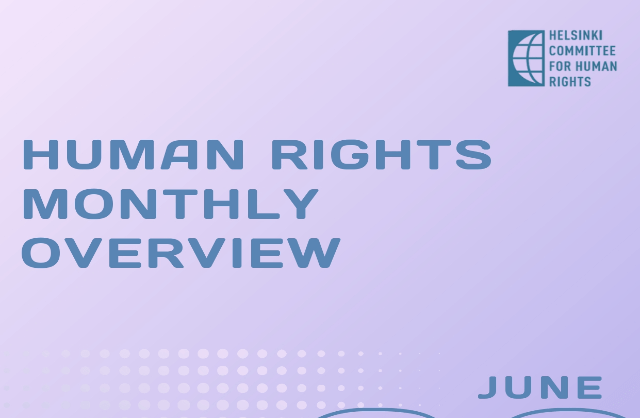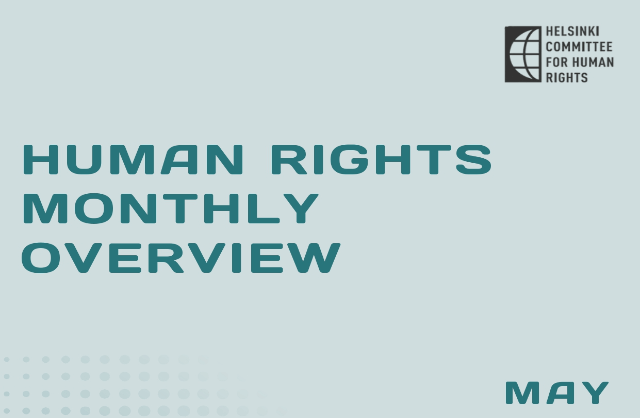The situation at the border crossings Gevgelija and Kumanovo for the period of February, 2018
March 9, 2018

Monthly report for February, 2018 on the situation at the border crossings Gevgelija and Kumanovo includes the following topics: Available facilities and conditions at the camp, Institutional treatment and irregular migration. The report can be downloaded at the following link.
Gevgelija
The situation with the RTC Vinojug, Gevgelija, over the course of February 2018, was more dynamic in comparison to the previous months. Apart from the increased frequency of movement of groups transiting through the country, there was also an increase in the number of refugees who were accommodated in the camp and submitted an asylum request. The number of cases of interception of larger groups of refugees exceeding the number of 15 people also increased.
Available facilities and conditions
At the start of the month, seven refugees were accommodated in the camp.
The Public Utility company Zdravje – Veles, carried out complete disinfection of all the premises in the camp. Generally, the camp hygiene is at a satisfactory level.
At the start of the month, representatives of IOM and the Ombudsman’s Office, i.e. the National Preventive Mechanism, paid a visit to the camp.
In the camp, and in the vicinity of Gevgelija, there is a presence of police officers from foreign countries, i.e. the Czech Republic, Croatia and Austria.
Legis and La Strada hold creative workshops for the women and children.
Over the course of the month there was an interruption to the internet connection in the camp, which posed a big problem for the refugees accommodated there, bearing in mind that it is their only access to information and means of communication with the world outside. No Internet connection was set up by the end of the month.
Institutional treatment
Over the course of February 2018, a total of about 110 refugees were brought to the RTC Vinojug. On 03.02.2018, a three-member family originating from Iran, i.e. a husband and wife and their six-year old son were brought to the camp. The family was accommodated in the camp, and was transported to Greece several days after, at their own request. Over the course of the same day, a refugee originating from Afghanistan was brought to the camp after previously living in Turkey for a certain period of time while his family has been accommodated in the camp in Vinojug for nearly a year. On the next day, two refugees originating from Pakistan were brought to the camp on two occasions (two refugees on each occasion), who, after the adequate procedure was conducted, were transported to Greece.
Early in the morning of 06.02.2018, in the vicinity of the village of Selemli, Bogdanci, a group of 24 refugees were discovered having crossed the Macedonian-Greek border with the help of smugglers whom they paid more than 2000 EUR per person. 12 refugees caught in the group have origin from Pakistan, 7 from Syria, two Kurds from Turkey, one refugee originated from Iran and two originated from Iraq. The people in the group were at different ages, 18 to 38 years old. Apart from one woman originating from Iraq who was traveling with her brother, all the other people in the group were males. The woman complained of health problems as a result of which she was taken to the City Hospital in Gevgelija on several occasions, where she was provided with medical aid. All the refugees from the group were given food and clothes, while the security services proceeded to profile and register them. The refugees originating from Syria (7) and Iraq (2) were accommodated in the camp, and already on the next day only 2 Syrians had stayed in the camp as all the others had been transported to Greece at their own request.
On the next day (07.02), another group of 16 refugees were brought to the camp again, all of them males, originating from Pakistan, who were caught by the police in the vicinity of Bogdanci. It is typical that within the ranks of this group, 5 people were found who had been brought to the camp over the course of the previous day, and they were immediately sent back to Greece. Towards the end of the day, after they were provided with humanitarian and medical aid, they were all transported to Greece. On the same day a family originating from Iraq and consisting of a husband, wife and three juvenile children were brought to the camp and were immediately sheltered and accommodated in the camp.
In the period between 8 and 13 February 2018, a total of 21 refugees (individuals and families) were brought in the camp in smaller groups and on several occasions, originating from Pakistan (3), Iran (7), Iraq (6), Afghanistan (3) and two originating from Shri Lanka. 9 out of them (Iraq and Afghanistan) were accommodated in the camp due to their need for medical attention. The rest of them were immediately sent back to Greece. Some of them had paid 6000 EUR per person to the smugglers from Greece in order to be transported to Gevgelija. What is peculiar is the case of the three Afghans who, according to their testimonies, had attempted to reach the Western European countries through the Republic of Bulgaria where they had been physically abused by the police officers. They all had visible injuries and bruises, and one of them claimed that he had lost the vision on one of his eyes due to the police brutality he endured.
On 15.02.2018, another larger group of 26 refugees was brought to the camp, consisting of 5 families originating from Iraq who had been intercepted by the police in the vicinity of Gevgelija. They were all accommodated in the camp due to exhaustion, thereby raising the number of refugees in the camp to 48. Among them, there were 17 males, 9 females and 22 children.
On 21.02.2018, 3 refugees were brought to the camp who initially said that they were a father and two (adult) daughters originating from Syria. During their talk with the security services, it was discovered that they were in fact Kurds originating from Iraq and that they were not a father and daughters, but were related more distantly. They were temporarily accommodated in the camp, and several days later deported to Greece, after the police had interviewed them several times.
On 22.02.2018, 4 refugees originating from Iran were brought to the camp, including a woman who was traveling with her husband and brother. According to their statements, they had paid the smugglers 4000 EUR each to be transported from Greece to Germany. It was unclear from their statements whether they had reached Serbia or only Tabanovce, where they got on the bus to Gevgelija. They were provided with humanitarian aid and clothes, whereas the security services interviewed them.
Towards the end of the month, a larger group of refugees, i.e. about 43 refugees accommodated in the camp, submitted asylum request. It is expected that over the course of the next month, the Asylum Department under the Ministry of Interior shall conduct interviews with them and based on the interviews they will subsequently be taken to the Reception Center for Asylum Seekers in Vizbegovo, Skopje.
Kumanovo
Over the course of February 2018, the situation in the RTC Tabanovce was relatively unchanged, with temporary changes in the number of refugees and migrants who were accommodated in the camp. In terms of numbers, the situation in the camp from the beginning to the end of the month fluctuated between 20 and 40 refugees. By country of origin, most often there were people from Pakistan, Syria, Iran and Afghanistan in larger numbers along with a lower number of people originating from Iraq, Libya, Algeria, Iraq and one refugee from Turkey. The movement of the groups continues to be in two directions, i.e. both from Greece and from Serbia.
Available facilities and conditions
No major infrastructural changes were observed in the camp.
Coordinating meetings were held between the organizations and institutions present in the camps on regular basis. The coordinating meetings are held with the Ministry of Labor and Social Policy, as well as the Border Police, separately. During the meetings, the ongoing situation, problems and challenges with the refugees are discussed.
Institutional treatment
At the start of the month, 25 refugees from various countries of origin were found in the camp, 24 of whom were male and one female. According to their countries of origin, they were from Pakistan (8), Syria (7), Afghanistan (6), Libya (4) and one originating from Bangladesh. This number changes on daily basis and varies depending on the groups or individuals coming and going. In most of the cases the refugees are males, but there are also women and children (as well as unaccompanied juveniles).
Two refugees originating from Afghanistan who arrived in the camp at the start of the month, complained of physical abuse by the Serbian police. As a result of this they sustained visible physical injuries, for which they got medical aid in the local hospital.
On 14.02.2018, a married couple from Afghanistan with a 19-month old baby arrived to the camp. On 17.02.2018, on the other hand, ten people originating from Iran arrived to the camp, consisting of two families, two women and seven underage children. They were all admitted and accommodated in the camp. According to their testimonies, they arrived from Greece to Macedonia with the help of a smuggler who left them at the bus station in Kumanovo. They were found and sheltered by the mobile team of the Red Cross, and they got threats to their safety by the smugglers which was the reason why they wanted to leave the camp as soon as possible. Their transport to Gevgelija (on the way to Greece) was organized in a few days.
Limited internet access was also observed in the camp in Tabanovce, which posed a significant problem for the Refugees accommodated in the camp.
Irregular migration
Over the course of February 2018, the Ministry of Interior registered three criminal and legal events related to migrant smuggling. The first of them occurred on 02.02.2018, when in the vicinity of the village of Miletkovo, Gegelija, the police patrol noticed a cargo vehicle driven by person originating from Strumica. 15 refugees originating from Syria (8), Pakistan (5) and two from Iraq, were found in the vehicle. The driver was deprived of liberty and the refugees were detained for further proceedings. On the same day, on the border crossing of Bogorodica, one cargo and one passenger vehicle came to the border and were held for additional search as their weight exceeded the weight they reported at the customs office. In the search process, 5 people originating from Afghanistan were discovered in the truck, three of whom were underage, and one person from Bangladesh. According to their statements, they had boarded the vehicle in Turkey. After the forensic inspection, they were all admitted to the Reception Transit Center Vinojug, for further proceedings.
In the third case, on 04.02.2018, in the vicinity of the village of Rechica, police officers found 5 migrants (three Kurds and two Syrians aged 18-35) during routine control of passenger vehicles. The driver of the vehicle got the measure of detention.
At the same time, the Ministry informed that they had pressed criminal charges against two persons from Kichevo who were caught transporting 8 migrants originating from Iran, Turkey, Iraq and Pakistan, aged 19 to 38, on 09.02.2018.


